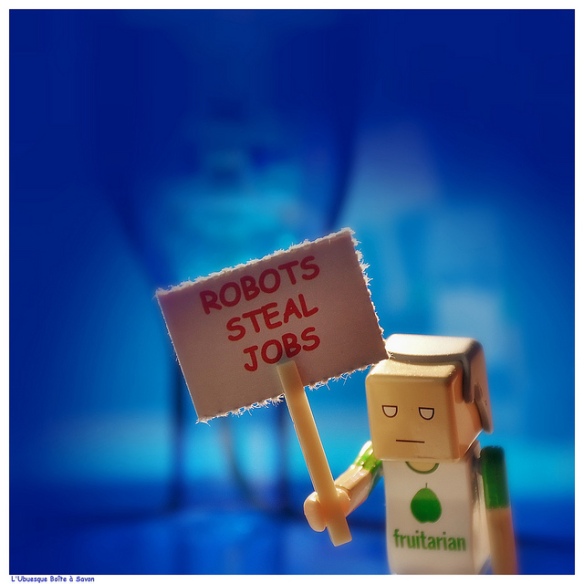I attended the annual Scotland IS Technology Trends conference where Richard Marshall – Research Director, Mobile and Client Computing, at Gartner – talked us through their top technology predictions for 2015. The theme for this years predictions was that digital business is driving big change, detailing how it will affect (or already is affecting our lives). What struck me as interesting was how Richard described how we are turning computers into people and people into computers.
“We are moving from a world where people behave the way computers work, towards a world where computers work the way people behave.”
Just a few of our favourite trends where this is evident were:
- By 2018 digital business require 50% less business process workers and 500% more key digital business jobs, compared to traditional models.
Considering the ratio of traditional business process workers to digital businesses at the moment, this is a massive shift in the jobs market and where skills will be required. IT leaders must continue to develop new hiring practices to recruit for new non traditional IT roles and adapt to this, figuring out where the digital jobs are and adapting their processes accordingly.
New technology processes are continuing to eliminate many jobs. People are now in greater control and reducing the need for certain intermediaries. Richard used the examples of writers who now have the ability to sign up to Kindle Direct Publishing and publish their very own books, eliminating the need for publishers. Book publishing has now become a digital business where people can harness digital abilities and take control of their own content.
- By 2020, developed world life expectancy will increase by 0.5 years due to widespread adoption of wireless health monitoring technology.
As Richard says, extending the average life by half a year, within the next 5 years is huge. Wearable technology is a much talked about trend we have seen for a few years, however has continued to grow to significantly impact the life expectancy of the developed world. The wide range of wearable technologies that have been specifically designed to improve fitness, reduce risks and care costs has been widely adopted by individuals and businesses – people who are wearing these devices are consciously trying to reach their step counts for each day, resulting in a greater awareness of their fitness levels. What’s more, they are increasingly impacting business processes and financial models. Health providers in the US are giving workers free Fitbits, adapting healthcare premiums to their achieved exercise quotas. Wearable devices now play a crucial part of the NHS’s future, where fitness trackers can allow health professionals to analyse and act upon early warning signs for patients with serious conditions, cutting treatment times, risks and costs.
- By year ending 2016, $2.5 billion in online shopping will be performed by mobile digital assistants.
Mobile digital assistants will be making more automated purchasing decisions on behalf of people, directly impacting businesses marketing strategies.
Marketing executives must develop techniques that capture the attention of digital assistants as well as people, which invokes a number a questions; how do you advertise to machines rather than traditionally advertising to humans? How will digital assistants perceive brands? Will content be obsolete? Marketing and advertising teams will need to take into consideration that digital assistants will make purchases on the basis of cold economic facts, such as price and proximity, rather than brand awareness and company ethics.
- By 2017, nearly 20% of durable goods e-tailers will use 3D printing to create personalised product offerings.
3D printing has now become a lot faster and a lot cheaper and there is a huge amount of it happening across many industries. More and more people are looking to build and customise products on demand. This now needs to be considered right down the supply chain – if products are being printed on demand this again eliminates the need for several intermediaries, impacting storage, logistics and skills involved.
- By 2018, more than half of all apps will be created by enterprise business analysts using codeless tools. By 2020 app creation can be fully automated.
As in industry, we will be creating an incredible amount of mobile apps. Richard predicts we will create at least twice as many apps as we have created today by 2020. However these will become much simpler and more automated than they are today. This in turn impacts the role of the software/mobile developer who will now have to become even more specialist, as business analysts will have greater access to codeless tools to create fully functional, fully integrated, cross platform mobile apps at the press of a button. The challenge for businesses is to figure out how to deliver more apps, faster whilst protecting data and retaining good governance, figure out how software will be created in the future and how this impacts those creating the software.
These are just few of the trends from Gartner, some of which we seen at last years technology trends event and will most likely see at next years. These are major trends covering a large period of time which will evolve and becoming increasingly impactful year on year, as digital continues to drive changes in business and in our lives.

Follow us on:






















